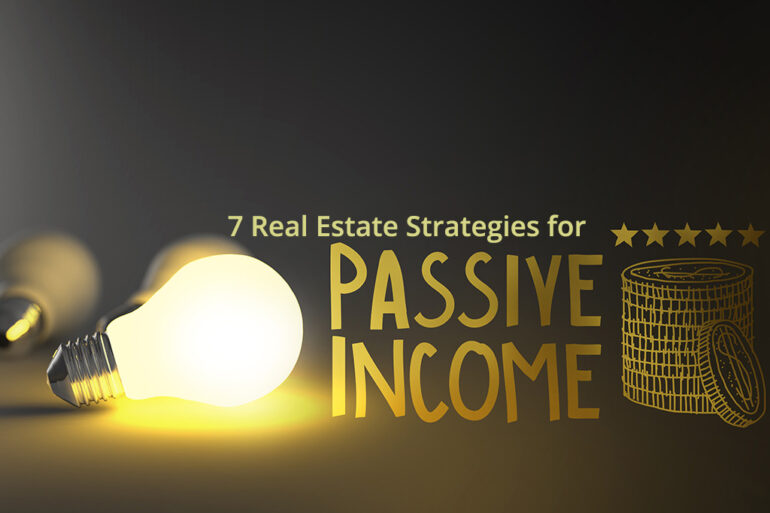7 Real Estate Investing Strategies for Passive Income
Have you ever wanted to increase your income? How about when you’re sleeping?
While passive income is wonderful and typically means income earned with little to no effort, it does not magically appear under your pillow while you’re dreaming. Whichever strategy you choose, it will require at least a little work in the beginning to get started.
The strategies I’m covering today vary in effort level. There are a couple classic real estate investing strategies listed here that require a little more elbow grease at the start. Luckily, the long-term return for that upfront work with minimal maintenance effort can pay big dividends later on.
1. Rental Property
When someone mentions passive income through real estate, what comes to mind for a lot of new investors is rental properties. However, rentals require the most work out of all the strategies listed here.
Once you have a tenant set up in a property with a long-term lease, you’re in business. To do that, you will need to find, purchase, and ready a property for your renter. Depending on tenant turnover and maintenance issues, this isn’t the most passive strategy.
While it requires a bit more effort, it is a great long-term strategy for many, and with the right resources it could be the perfect way to build your investment portfolio.
Rental properties become “passive” only when you have everything running smoothly. Once in while you will have a tenant that always pays on time and fixes things themselves, but tenants like this are the exception to the rule and are akin to winning the landlord lottery.
If you want to make your rental investments more passive, you need to stop being a landlord. Hire a GOOD property management company. A property management company can handle most of the hands-on work for you and set up a mostly automated monthly return.
This will cost you 5% to 15% of your monthly rental payment, but for some it’s well worth the cost as it will then move to nearly passive income.
2. REITs
REIT stands for real estate investment trust. These are a more hands-off strategy than rentals since you will be part of a group of (minimum 100) investors. These trusts use the funds of investors to buy properties (usually of the commercial variety).
For investors it’s way less work to manage and easier to cash out than an individually owned property. However, since your investment will be concentrated in specific industries, it can be riskier.
REITs become truly passive after your initial research into which to buy into. The only time you need to spend in this side of investing is examining their yearly reports.
3. REIGs
Real estate investment groups are similar to REITs. One of the biggest differences between the two is size. There are no specific size restrictions for a REIG. This could make it an appealing option if an REIT doesn’t work for you.
There are some drawbacks, though. Since they are not as regulated as REITs, REIGs can easily be mismanaged. That may create higher risks for you, and they do sometimes require higher fees in their bylaws than other organizations.
These aren’t necessarily liquid investments. Depending on the terms laid out in your group agreement, it could be difficult to pull out to reinvest elsewhere.
4. RELP
A real estate limited partnership only exists for a set amount of time. There will usually be a specific partner to manage the properties while investors pool money to fund the purchases.
Since there is a time limit for this investment, it is not very liquid. You won’t see your profit until after the properties are sold and the dividends are distributed to investors.
A RELP is great for a passive income stream. As an investor, you don’t need to do much other than wait for your investment to pay off. At the same time, this can also limit your control of the investments.
5. Online Crowdfunding
This is a great strategy for the newbie investor. Using online platforms, you can invest in different real estate developers. Sometimes these platforms require a fee for use, but they can be fantastic for creating a diverse portfolio and minimizing your risks.
A couple of popular platforms are Fundrise and Crowdstreet.
The downside is that as an investor, you don’t have any control over the properties and are trusting the developer entirely for your ROI.
6. Real Estate Notes
You don’t have to buy a home or even a share of one to be a real estate investor. With real estate notes (specifically mortgage), you can step in as the bank/lender.
The type of notes you buy is up to you; you could buy performing (someone who is paying) or nonperforming (someone who isn’t). The performing notes are generally more expensive, so there will be a smaller profit margin for you.
If you decide to buy nonperforming notes, which you can typically get at a discount, be prepared to deal with foreclosure and all that goes along with it.
7. Private Lending or Partnering
If you know someone who is looking to flip a home or start a rental portfolio, you could fund their project.
Without doing the heavy lifting, you can sit back and enjoy a share of the profits while also helping someone on their way into real estate investing.
Becoming a lender isn’t completely passive. The work will be mostly front-loaded when it comes time to vet your potential borrowers. The hard work starts when someone stops paying and goes into collections, and you have to be the collector.
Find Your Fit
Whatever strategy you choose, make sure you do your research. Know what your plan is for timeline, taxes, insurance, and legal issues. Being prepared ahead of time will make it so much easier to enjoy your passive income stream once you’re up and running.








